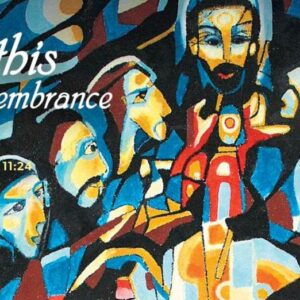John 13:1-17, 31b-35
1 Now before the festival of the Passover, Jesus knew that his hour had come to depart from this world and go to God. Having loved his own who were in the world, Jesus loved them to the end.
2 The tempter had already put it into the heart of Judas son of Simon Iscariot to betray Jesus. And during supper 3 Jesus, knowing that God had given all things into his hands, and that he had come from God and was going to God, 4 got up from the table, took off his outer robe, and tied a towel around himself. 5 Then Jesus poured water into a basin and began to wash the disciples’ feet and to wipe them with the towel that was tied around him. 6 He came to Simon Peter, who said to him, “Lord, are you going to wash my feet?” 7 Jesus answered, “You do not know now what I am doing, but later you will understand.” 8 Peter said to Jesus, “You will never wash my feet.” Jesus answered, “Unless I wash you, you have no share with me.” 9 Simon Peter said to him, “Lord, not my feet only but also my hands and my head!” 10 Jesus said to him, “One who has bathed does not need to wash, except for the feet, but is entirely clean. And you are clean, though not all of you.” 11 For Jesus knew who was to betray him; for this reason he said, “Not all of you are clean.”
12 After Jesus had washed their feet, had put on his robe, and had returned to the table, he said to them, “Do you know what I have done to you? 13 You call me Rabbi and Lord—and you are right, for that is what I am. 14 So if I, your Lord and Rabbi, have washed your feet, you also ought to wash one another’s feet. 15 For I have set you an example, that you also should do as I have done to you. 16 Very truly, I tell you, servants are not greater than their master, nor are messengers greater than the one who sent them. 17 If you know these things, you are blessed if you do them.
31b “Now the Son of humanity has been glorified, and God has been glorified in the Son. 32 If God has been glorified in the Son, God will also glorify the Son in God’s self and will glorify the Son at once. 33 Little children, I am with you only a little longer. You will look for me; and as I said to the Judeans so now I say to you, ‘Where I am going, you cannot come.’ 34 “I give you a new commandment, that you love one another. Just as I have loved you, you also should love one another. 35 By this everyone will know that you are my disciples, if you have love for one another.”
————————
Please pray with me this evening, church:
Holy God,
Teach us love again tonight.
In water and washing, show us what love looks like.
Help us receive love.
So that we might be love.
Amen.
————————
We’ve arrived at kind of the midpoint of Holy Week. From Palm Sunday up until now, we haven’t gathered together for worship, but Jesus has been busy. Cleansing the temple, teaching, healing…and today we remember a meal Jesus shared with the disciples. And from this point on, the activity and the drama really start to pick up. Through these Great Three Days, we’re hurtling toward Jerusalem, the cross, Calvary, the tomb, on to Easter dawn.
But tonight we pause to remember a meal and a profound act of service and love.
What’s the thing that you just have to do before beginning any meaningful or significant activity? What’s the thing that you have to do before you can do anything else of consequence?
I have to brush my teeth. Before going anywhere or doing anything important, I have to feel like my mouth is clean. It just feels better to me.
Jesus enters this moment, this pivotal hinge point of Holy Week, where, I imagine, a few of us might start…with a meal. The beginning of the end of Jesus’ earthly ministry and life begins with eating. A meal among friends. A dinner between teacher and followers. Shared food for the journey that lies ahead of all of them.
So what do you have to do, church, before embarking on any serious undertaking in your life?
How are you coming to this hinge point in Holy Week?
I have a good group of friends and colleagues who make a habit of setting aside time every Wednesday of Holy Week to go get pedicures. I did it once with them in seminary. The logic is, as pastors, in the midst of a week busier than any other time in the church year, it’s important to take time for a little self-care, as well. That, and if we’re going to be washing feet, we might as well have nice-looking and nice-smelling feet. I’m sure you agree.
Do not worry, church, pedicures are not a prerequisite to having your feet washed this evening. Interestingly, I would say that it kind of misses the point. It’s your feet, just as they are, that Jesus is interested in washing and blessing.
Or your hands.
I get it. Some of y’all aren’t feet people. I hear you. Accommodations have been made.
But here’s the thing, for 40 days we’ve traveled this Lenten pilgrimage together. From Ash Wednesday, being marked with dust and reminded of our deep mortality, to now as we culminate in the final week of Jesus’ earthly ministry, our feet are tired. They should be. As we’ve turned our focus inward on ourselves this season, hearing God’s call to discipleship on our lives, and wrestling with the sometimes harsh realities of our patterns of behavior that are not reflective of who God is calling us to be, 40 days feels like a long trudge. Weary is the road we’ve trod these past weeks. Our feet, our hands, are in need of some rejuvenating care.
And into this great need of feeling worn out and in need of care, Jesus gets up from the table, sees your need, and bends down to wash and bless your feet.
For a people in need, this footwashing is a deeply meaningful act of service. We generally like to wash our own feet, but I’ve also spent enough time in hospitals and rehab facilities to know that not everyone has the ability at all times to wash their own feet. Not to mention the two little ones in my house, one of whom probably could wash his own feet if he wanted to, but whose feet I also take responsibility for. Sometimes we need someone else to care for our feet.
Some folks have a strange relationship with feet. They just don’t like them. I’m not that kind of person. I don’t mind feet, they don’t bother me. Generally speaking, we’ve all got them. And our feet do a lot for us. They get us around from place to place. They let us stand and talk with friends, or stand at a counter and cook dinner for loved ones. Our feet help us to jump and play and run. They help us dance and get our groove on.
Our feet are awesome. And I bet we don’t give a whole lot of thought to how we care for our feet.
Or hands, for that matter. We’ll have a handwashing station in just a moment for those who prefer. The absolute same could be said for our hands. They do a lot for us and for others, and I just don’t think we give a lot of thought to how we care for them.
To me, the act of footwashing or handwashing, and specifically, having someone else wash your feet or your hands is an act of tremendous vulnerability. And an act of care. A lesson in humility. And service. And it’s a profound act of love.
It’s a teaching moment for Jesus. “If I, your teacher and Lord, have washed your feet, you also ought to wash one another’s feet.” In other words, I’ve set for you an example for how you ought to be in this world as my disciples. Followers of Jesus are to be known for service to others—a literal posture of servanthood and humility. The rest of the world values power and strength, followers of Jesus are in a race to the bottom, outdoing one another in service and love of others.
“By this will everyone know that you are my disciples, if you have love for one another.”
Not through your religiosity. Not through your spiritual report card. Not through your ability to defend your viewpoints or win arguments. Not through your self-righteousness. Not even through all the good things you’ve done.
But through your love. If you have love for one another.
Through the way you love.
And love costs you something. Always.
It costs part of yourself. Love will cost you the need to win every argument, or the need to feel superior to other people. Love will cost you a certain amount of respectability by asking you to stoop down and take the posture of a servant. Love will cost you the perfectly manicured façades you feel like you need to display to the world by finding you hanging out with, serving, and loving all the so-called wrong people.
I said it on Sunday morning, Holy Week is about participation. And Jesus models this participation. Sharing a meal. Having your feet or your hands washed. These intimate and tender actions are at the heart of what it means to share and have love for one another.
“One who has bathed does not need to wash, except for the feet, but is entirely clean. And you are clean, though not all of you are clean.”
The author of John goes on to say that Jesus was talking about Judas Iscariot…and that might have been the case…but as I reflect, there are parts of me that feel unclean… There are parts of myself that I’d rather keep hidden from Jesus. There are parts of me that betray Jesus, that are less than the ideal follower of Christ, that don’t always live as God wants me to live… There are parts of me that feel unloveable by God…
Perhaps you, too.
“You are clean…though not all of you…is clean.”
Be honest, church, about those parts of yourself.
Be truthful about your need to wash up.
Difficult as it is, be honest about them.
Do you really think God doesn’t know those parts of you already?
Your participation is invited.
Bring your dusty and weary souls to be washed.
Bring your dusty and weary selves to this feast of mercy and grace.
Welcome to these most holy days. Welcome to the Triduum—the Great Three Days.
The beginning of this end has begun.
First, we wash. Then, we eat.
Find compassion here. Hold love in your hands.
Be renewed, strengthened, and nourished to love a world wrestling with its own unloveable places.
Come, beloved.
This gift of love is for you.

